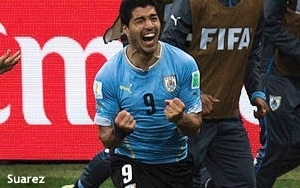
Disclaimer: Unlike most red-blooded American males, I am not that into sports, even the “American” ones. But every once in a while, an event comes along that breaks through the -- pardon
my expression -- “inside baseball” aspects of a sport and connects with mainstream viewers like me. It becomes not just a sporting event, but a television event that we can all participate
in and even root for. The World Cup has been one of those -- especially this year.
It could be that I first started watching the 2014 games while abroad covering the Lions Festival in Cannes. Let
me tell you, if you really want to get into a sport, try watching it in a crowded bar with the home country team competing for a chance that comes only once every four years to prove they’re the
best in the world at something most of the rest of the world cares about. I don’t think it hurt that so many people from all around the world -- the Lions’ international delegates -- were
also there in Cannes simultaneously rooting for their respective home teams, even the U.S.
advertisement
advertisement
When I returned to the U.S. I was surprised to feel the fervor, energy and interest surrounding the
World Cup was almost as high at home. I can think of many reasons why this World Cup is a bigger U.S. television event than any before. One is that the American population is simply more international
than it was four years ago. Another is that the aging of our indigenous population means a greater share of Americans grew up playing soccer, and understand what it feels like to actually play it, not
to mention what’s going on.
I will probably never know what it feels like to play a soccer tournament, but that hasn’t stopped me from becoming a fan of other big TV sports events
-- say the Olympics -- because I at least understood what was going on. And for a sport that seems as simple as soccer does -- hey, it’s just a bunch of guys trying to kick a ball into each
other’s net -- the biggest impediment to getting me to be a hardcore soccer fan is that it’s really, really confusing to me. So here’s today’s TV Blog fill-in bit of criticism:
Why doesn’t television do a better job of explaining how the sport is played? Actually, I can only speak for ESPN’s coverage here, because I didn’t really understand what the
European announcers were saying, but I think it has been missing some really good teachable moments that would encourage more casual viewers to become longer-term soccer fans.
And I’m
not just talking about subtle nuances of the game, but some basic things that would help a viewer follow the game. I mean, I can’t even figure out how long the games are. Is it just me or is the
method FIFA uses to inform fans about the time left to play really confusing? I get the sense that they add time at the end of the game for time-outs related to penalties and injuries, but it’s
not always clear how much game time is actually left.
A little bit of instruction on what constitutes good game play or strategy wouldn’t hurt. I understand that someone actually kicking
or head-butting the ball into the opponents’ net is a good thing, but what about all the other action moving the ball up and down the field? Or how about the players who are moving it? With the
exception of Brazil’s Neymar da Silva Santos or Uruguay's Luis Suarez, I got very little sense of who any of the players are, and I was only aware of the second guy because of the news coverage
that erupted when he bit another player.
I understand that much of the basics I would need to understand to enjoy the sport better would only slow the game down for established fans, but
I’m thinking that ESPN, with all its multiple channels, could televise a version for novices like me.